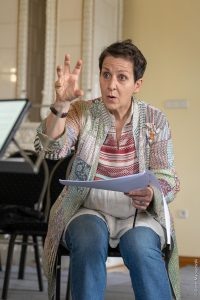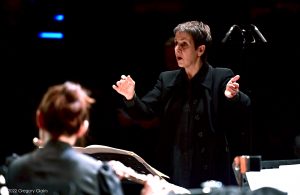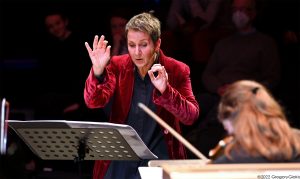Empathic coexistence of sound
Konstantia Gourzi - Composer・Conductor
A biographical Essay
"Music should convey a wealth of feelings, hope, expansion of consciousness, fantasy, life and love to people. It is important to me to use sound to activate the positive forces inherent in us. Accompanying this process is an exhilarating experience for me."
Born in Athens and now living in Germany, composer and conductor Konstantia Gourzi has followed an artistic path since her student days that is marked by openness to the highest quality of sound –regardless of its origin – as well as by inner integrity and artistic authenticity, free from dogma.
The cultural and historical diversity reflected in both life and music has always been a profound source of inspiration for her. Her artistic work begins with respect and curiosity for other musical traditions. For Konstantia Gourzi, music is a universal language: it does not ask about origin, does not judge – and has the power to bring people together. Her compositions draw from a wide range of sources: she is inspired by traditional instruments and musical styles as well as by the international avant-garde, whose developments in sound, noise and structure play a central role in her work.

Renowned for her wide-ranging activities, the composer often finds inspiration in social and spiritual themes, Greek mythology, and the sounds and vibrations of nature. Her works are shaped by a strong dramaturgical structure and the desire to create new spaces and energies through sound.
Her compositions are, in her own words, “stories of sincere communication” – an invitation to listeners and to society to expand their perception with empathy. With her unmistakable contemporary voice, Konstantia Gourzi opens up spaces for the audience to feel and reflect.
Experiences along the way
It was a stroke of fate that Konstantia Gourzi became a composition student of Michael Travlos in Athens – a former student of Isang Yun, with whom she would develop a close artistic connection years later. Throughout his life, Yun sought to fuse the ancient traditions of his Korean homeland with contemporary musical influences. The dialogue between traditional roots and the search for new forms of expression also became a central theme for Konstantia Gourzi – and continues to shape her artistic identity to this day.
In 1987, she came to Berlin to study composition – and soon realised how vital it was to define herself artistically and find her own compositional path. At first, she felt that her studies lacked artistic freedom; traditional models felt constraining. But the music scene in Germany opened up new horizons for her: a course with Diether de la Motte in Darmstadt gave her freedom and renewed hope. Immersing herself in György Kurtág’s vibrant miniature cosmos opened up undreamt-of perspectives for her.
At the same time, she studied conducting in Berlin – but here, too, she missed the openness and inspiration she had hoped for. Instead, she made use of the city’s unique opportunities in her own way: with great curiosity and enthusiasm, she attended almost every rehearsal of the Berlin Philharmonic Orchestra over a period of four years. In this way, she gained her most formative experiences in the living moment of musical creation – at the highest level. Claudio Abbado, whom she assisted, in particular showed her “how music can breathe”. She also received decisive musical inspiration from legendary conductors such as Carlos Kleiber, Günter Wand, Giuseppe Sinopoli, Sylvia Caduff, Carlo Maria Giulini, Michael Gielen, Bernard Haitink and Nikolaus Harnoncourt.
Ensemble founder and professor
Konstantia Gourzi embodies the rare but immensely fruitful combination of composer, conductor and professor. She brings a clear artistic identity to the ensembles she leads. As the first woman to conduct Verdi’s La Traviata at the Athens State Opera in the 1990s, she became a pioneering figure and role model for a new generation of female musicians.

Driven by a desire to explore new sonic experiences and collaborate musically with like-minded artists, she began founding and conducting her own ensembles early in her career. In 1991, she founded the ensemble attacca berlin and the international concert series Zeitzonen. From 1999 to 2007, she directed the Echo Ensemble at the Hanns Eisler Academy of Music in Berlin, which she had established. In 2002, she was appointed professor of ensemble conducting for new music at the University of Music and Performing Arts Munich. With her remarkable versatility and artistic energy, she quickly became a central figure in Munich’s contemporary music scene—and beyond. One of her earliest and most defining steps in Munich was the founding of ensemble oktopus, which consists of students and has been under her direction ever since. Today, ensemble oktopus is an integral part of Munich’s cultural life, known for its stylistic diversity and high interpretative standards.
Gourzi imparts to her students a deep awareness of contemporary music in all its facets. She encourages young musicians to develop a personal relationship with the new and unpredictable, to explore contemporary playing techniques and and to experiment with new ensemble formats – always guided by her reliable and inspiring mentorship. In 2007, she founded the network and ensemble opus21musikplus, in which contemporary music enters into a a dynamic exchange with other art forms and styles. As a conductor who embraces challenges and brings to the podium many years of experience, she is celebrated for her precise and compelling performances –just as she is for her achievements as a composer. Her artistic career is documented through numerous radio recordings, television broadcasts and live streams, as well as collaborations with renowned labels such as ECM, GENUIN, NEOS and Sony Classical.
Composer
In her compositions, Konstantia Gourzi explores the intuitive realms of the human mind – through musical and psychological phenomena in all their complexity. Her work is equally dedicated to delivering a clear message and creating a deeply felt musical experience. Alongside carefully constructed dramaturgy, intuition, sensitivity, and emotional depth play a central role in her creative process. Her music seeks to transcend the boundaries of the rational and the definable – merging topicality and timelessness into a unified whole.

Her commissions come from leading institutions such as the BBC, the Bavarian State Opera, the Berlin State Opera, the Venice Biennale, the Athens State Orchestra, the Lucerne Festival, the Grafenegg Festival, the Tonkünstler Orchestra, the Mecklenburg-Vorpommern Festival, the Bach Choir Salzburg, Camerata Salzburg, the Winnipeg Symphony Orchestra, and the DSO Berlin.
Gourzi composes for internationally acclaimed soloists including Anastasia Kobekina, Nils Mönkemeyer, François Leleux, Dorothee Oberlinger, Julian Prégardien, Mikael Rudolfsson, Elisabeth Plank, Danae and Kiveli Dörken, Cathy Krier and William Youn. She also writes for renowned chamber ensembles such as the Minguet Quartet, the Signum Quartet, the Auner Quartet, Cuarteto Quiroga, the Munich Opera Horns, OPERcussion, the Feininger Trio and the Meitar Ensemble.
Over 30 recordings document her compositional work, released by labels such as ECM, Sony Classical, GENUIN and NEOS, among others. Several of her albums have been nominated for the International Classical Music Awards and the German Record Critics’ Award. In 2023, Konstantia Gourzi was awarded the Opus Klassik as ‘Composer of the Year’. Her album Whispers has already reached over 50 million listeners on social media – and that number continues to grow.
In recent years, she has increasingly dedicated herself to developing new programme concepts – both as a composer and as a conductor. Among other things, she was Composer in Residence at the Grafenegg Festival 2020 (Austria), the Molyvos International Music Festival 2021 (Greece), the Kreisau Festival 2022 (Poland) and, in 2023, as composer and conductor in residence with the Duisburg Philharmonic Orchestra for the Eigenzeit Festival, which also included a transcultural call for compositions. her collaboration with the Bach Choir Salzburg and through concerts at the Mecklenburg-Vorpommern Festival 2024, Gourzi evokes dreamlike soundscapes – like musical rituals from another dimension. This otherworldly realm seems to permeate our familiar reality like an invisible current. It allows us to see the world in a new light and gently detach from habitual patterns of perception.
Konstantia Gourzi says that her motivation as a composer comes “from a force that is stronger than my consciousness – something that constantly urges me to unite worlds and express them musically. It feels like a secret, like something hidden that wants to be revealed. At the same time, it compels me to seek a connection between yesterday and today. Our roots, including our musical ones, are part of our identity. And by becoming aware of our own identity, we can accept what is different and others – without demanding that they change. I contribute to this by bringing together the sounds and attitudes of different religions and cultures – and by giving them shape through a musical coexistence.”
Christoph Schlüren,
updated September 2025 by Dr. Susanna Schulz
